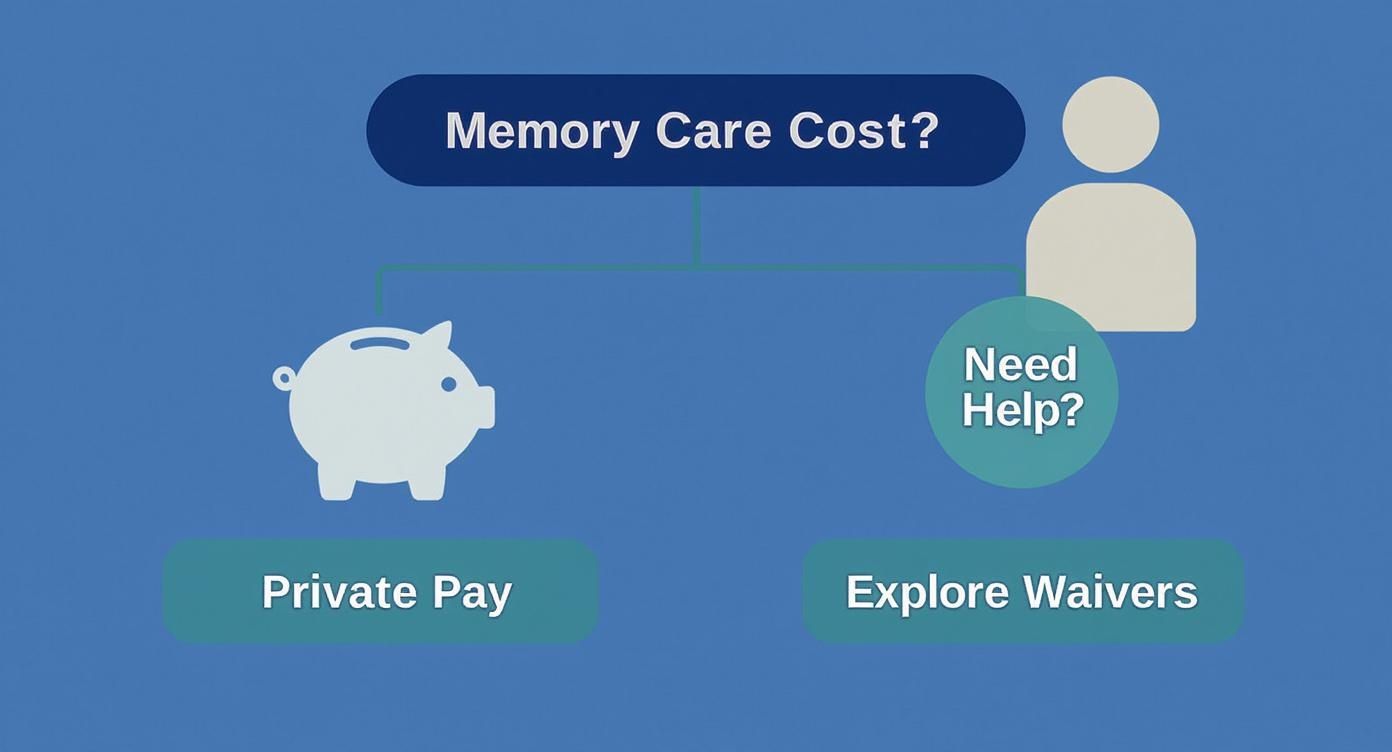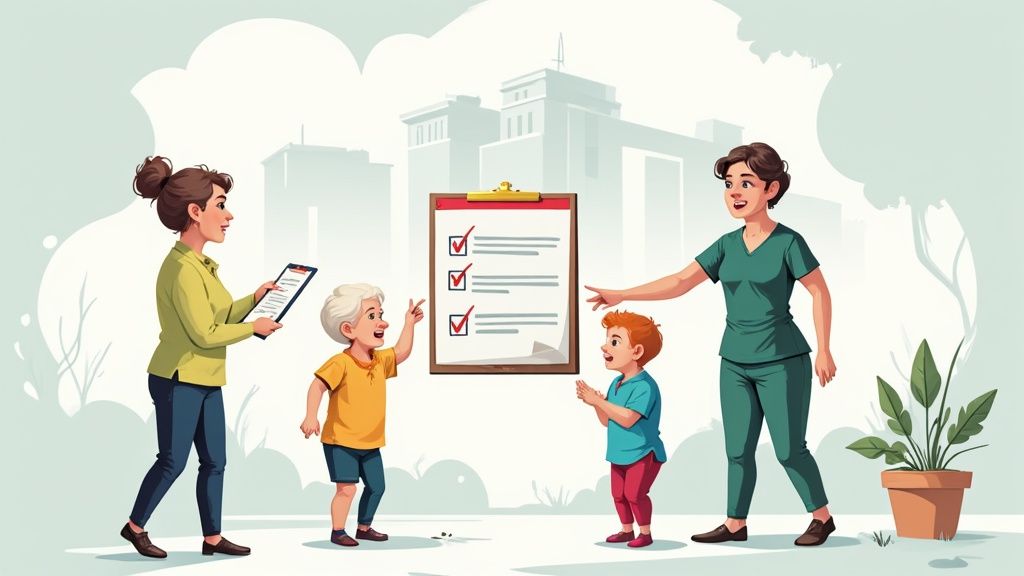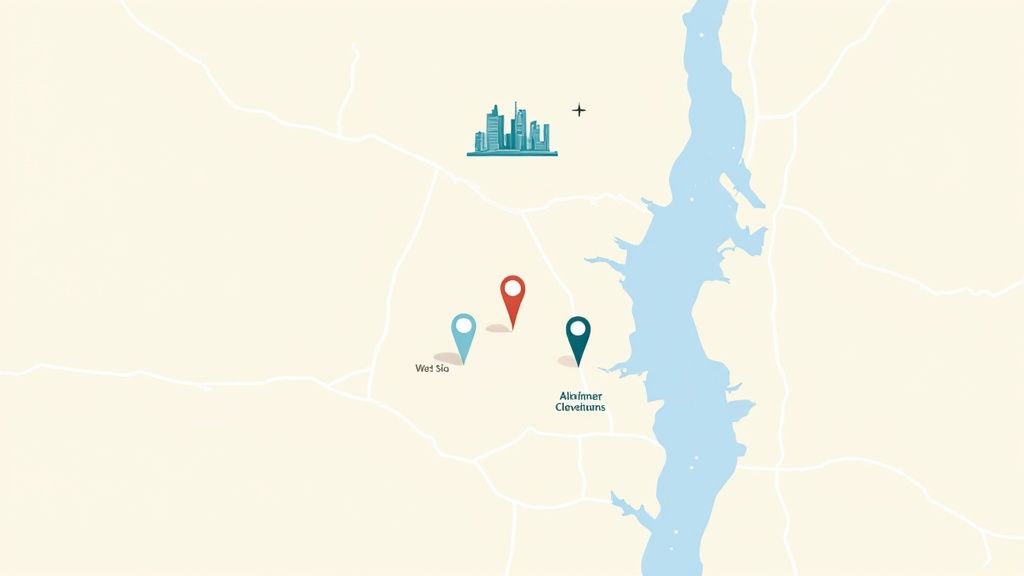A Guide to Memory Care in Cleveland, Ohio for Stressed Families
-
What it is: Memory care is a specialized type of assisted living designed for the safety and unique needs of adults with Alzheimer's or other forms of dementia.
-
Average Cost: The average monthly cost for memory care in Cleveland is $5,429 as of 2024. This is typically broken into a base rent and a separate fee for personal care.
-
How to Pay: Families in Ohio primarily use private funds, long-term care insurance, VA benefits like Aid and Attendance, and Ohio's Medicaid Assisted Living (AL) Waiver.
-
Key Local Resources: The Western Reserve Area Agency on Aging (WRAAA) is your first call for financial help, while the Alzheimer's Association provides crucial family support.
-
First Step: Start by having a candid family discussion about finances and care needs, then call the WRAAA at (800) 626-7277 to begin the eligibility screening process for potential aid.

Who this guide helps
This guide is for families in Greater Cleveland (including Cuyahoga, Lake, Lorain, Geauga, and surrounding counties) who are feeling the immense pressure of caring for a loved one with memory loss. If you are comparing senior living options, trying to understand costs, and need a clear, calm plan to make a decision you can feel good about, you are in the right place.
Key takeaways
-
Memory care is not the same as standard assisted living; it provides a secure environment and specialized staff training for cognitive conditions.
-
Costs are rising. Understanding the difference between a community's base rate (for room and board) and level-of-care fees (for hands-on help) is critical for budgeting.
-
Financial help is available but often has waiting lists. You must apply for programs like the Medicaid Assisted Living Waiver (AL Waiver) as early as possible.
-
Choosing the right community involves more than a simple tour. You must check staff training, observe resident engagement, and review the facility's public inspection reports from the Ohio Department of Health.
What Is Memory Care in Cleveland, Ohio?
Navigating senior living can be confusing, with different terms blurring together. For families in the Cleveland area coping with a loved one's Alzheimer's or dementia, memory care provides a specialized, safe, and supportive environment that standard assisted living does not.
Think of it as assisted living, but with crucial extra layers of security, staff expertise, and structured daily routines. Before diving too deep, it can be helpful for families to get a solid grasp on the medical side of things by understanding the distinction between mild cognitive impairment and dementia.
How Memory Care Differs from Other Senior Living Options
While both assisted living and memory care offer help with daily tasks, they serve very different needs. Here's how the most common options in Ohio compare:
| Care Type | Primary Focus | Typical Resident Needs | Environment |
| :--- | :--- | :--- | :--- |
| Assisted Living | Socialization & Independence | Help with daily tasks (bathing, dressing, meals) but mostly independent. Ohio licenses these as Residential Care Facilities. | Apartment-style living with communal dining and social activities. |
| Memory Care | Safety & Cognitive Support | Specialized care for dementia/Alzheimer's, including help with confusion, wandering, and behavioral changes. | Secure, structured environment with specially trained staff and therapeutic activities. |
| Skilled Nursing | Complex Medical Care | 24/7 medical supervision from nurses for complex health conditions. These are regulated by the federal Centers for Medicare & Medicaid Services (CMS). | Clinical, hospital-like setting with round-the-clock medical staff. |
Each option is designed for a different stage in a person's health journey. Understanding where your loved one fits is the first and most critical step. You can learn more in our detailed guide on memory care vs. assisted living.
The Cost of Memory Care in Greater Cleveland
Let's be honest—for most families, the cost of memory care is the biggest, most stressful part of this journey. So, let's break down what you can expect to pay for memory care in Cleveland, Ohio, and what those numbers actually mean.
Decoding the Monthly Bill
First, let's look at the numbers. Based on 2024 data from A Place for Mom, the average monthly cost for memory care in Cleveland is $5,429 per month. That's a noticeable jump from the $4,817 average we saw in 2022-2023, which tells you that these costs are on the rise.
It’s also worth noting that Cleveland is a bit more affordable than other parts of the state. The statewide average for Ohio is currently $6,180 per month. You can explore additional Ohio cost data to see how different cities stack up.
What's Included: Base Rate vs. Care Fees
When a memory care community gives you a price, it's almost always broken into two main parts: the base rate and level-of-care fees. Understanding this difference is critical to avoiding sticker shock.
-
Base Rate: Think of this as the rent. It’s the fixed monthly fee covering essentials like a private or semi-private room, three daily meals, housekeeping, utilities, and access to social programs.
-
Level-of-Care Fees: This is a variable charge tied to the amount of hands-on support a resident needs. Someone in the early stages who just needs medication reminders will have a much lower care fee than a resident who needs significant help with bathing, dressing, and managing difficult behaviors.
What this means for you: Before your loved one moves in, a nurse will conduct a detailed assessment to determine their level of care and the associated fee. Ask how often they reassess this level and what notice you'll receive if the price changes.
Here’s a sample cost breakdown to show how it works. These are example numbers; you must get specific figures from each community you tour.
| Cost Component | Example Monthly Fee | What It Typically Covers |
| :--- | :--- | :--- |
| Base Rate | $4,500 | Room, three meals a day, housekeeping, utilities, and scheduled activities. |
| Level-of-Care Fee | $950 | Personalized assistance with bathing, dressing, medication management, and incontinence care. |
| One-Time Fees | $1,500 (at move-in) | A community fee for apartment prep, the initial assessment, and administrative setup. |
| Total First Month | $6,950 | The initial, higher cost for the first month of residency. |
| Ongoing Monthly Total | $5,450 | The recurring cost after the one-time fees are paid. |
How Ohio Families Can Pay for Memory Care
<iframe width="100%" style="aspect-ratio: 16 / 9;" src="https://www.youtube.com/embed/0Z_M0IqzSgw" frameborder="0" allow="autoplay; encrypted-media" allowfullscreen></iframe>Figuring out the cost is one hurdle; figuring out how to pay for it is another. The good news is, you have options. Let's walk through the primary ways families finance memory care in Cleveland, Ohio, from personal savings to Ohio-specific government programs.
Private Funds and Long-Term Care Insurance
The most direct way to cover costs is with private funds—retirement income, savings, investments, and sometimes, the sale of a family home. The high price tag can be a shock, which is why it's important to understand all your financial options, including understanding how medical bills can necessitate selling your Cleveland home.
Another key resource is Long-Term Care (LTC) Insurance. If your loved one has a policy, now is the time to find it.
-
What it covers: An LTC policy is designed to help pay for services like memory care.
-
How it works: Benefits typically begin after a doctor certifies that your loved one needs help with a certain number of Activities of Daily Living (ADLs), like bathing or dressing.
-
What to do: Call the insurance company to confirm the daily benefit amount and ask about the "elimination period"—a waiting period before benefits start.
The Ohio Medicaid Assisted Living Waiver
For families with limited financial resources, Ohio's Medicaid Assisted Living Waiver (AL Waiver) can be a lifeline. This program helps cover the care portion of the bill in an approved assisted living or memory care community, making the monthly cost much more manageable.
What this means for you: In Ohio, the AL Waiver is not an entitlement program; there are a limited number of "slots," which often means a waiting list. That's why you should start the application process as early as possible. To qualify, a person must meet both medical and financial eligibility rules set by the state. The waiver pays for care services but does not cover room and board (rent and meals), which must be paid from other income like Social Security.
This decision tree can help you see which path to explore first.

For more specifics, read our guide on how Medicaid helps pay for assisted living in Ohio.
Veterans Benefits for Memory Care
If your loved one is a veteran or the surviving spouse of one, they may qualify for a benefit called Aid and Attendance. This is a tax-free monthly payment that can be used directly for memory care costs.
Key eligibility requirements include:
-
Service: The veteran must have served at least 90 days of active duty, with at least one day during a wartime period.
-
Medical Need: A dementia diagnosis usually meets the requirement of needing the "aid and attendance" of another person for daily activities.
-
Financial Need: Income and assets must be below a threshold set by the VA.
Example Scenario: A Cuyahoga County family is looking for memory care for their mother, the widow of a Korean War veteran. Her income is too high for the AL Waiver. An elder law attorney suggests the VA Aid & Attendance benefit. With help from a local Veterans Service Officer, they apply. Six months later, she is approved for a monthly payment of $1,478 (as of 2024), making a huge difference in her ability to afford care.
How to Choose the Right Memory Care Community

Choosing the right place means looking past polished brochures. You're searching for a community where the care, staff, and environment truly support someone with dementia. This requires a hands-on approach to evaluating memory care in Cleveland, Ohio.
Cuyahoga County alone has over 100 memory care facilities. A great starting point is to see what other families are saying by reviewing Cuyahoga County memory care feedback on Caring.com.
Preparing for Your Community Tours
A little preparation makes a world of difference. Your goal on a tour is to get a sense of what a normal day feels like and to get clear answers to your biggest questions. Schedule tours at two or three different types of communities—perhaps one larger facility and a smaller, more home-like one—to help you pinpoint what truly matters.
The Essential Tour Checklist
Use this checklist to stay focused and compare communities objectively.
| Category | Questions to Ask | What to Observe |
| :--- | :--- | :--- |
| Staffing & Training | What is the staff-to-resident ratio during the day and at night? What specific dementia care training does staff receive, and how often? | Are staff members friendly and engaging? Do they make eye contact and speak kindly to residents, or do they seem stressed? |
| Health & Safety | How do you manage medications? What is your protocol for medical emergencies and challenging behaviors like agitation? | Is the community secure with controlled exits? Are outdoor spaces safely enclosed? Are hallways well-lit and free of clutter to prevent falls? |
| Daily Life & Activities | May I see this month's activity calendar? How do you tailor activities for different cognitive abilities? How do you encourage nutrition and hydration? | Are residents participating in activities or are they disengaged? Is the dining room calm? Does the food look and smell appetizing? |
| Communication | How often can our family expect updates? Who will be our main point of contact? What is your process for handling family concerns? | Is the tour guide transparent and direct, or do they give vague answers to tough questions? |
Checking a Community’s Official Record
After your tours, do your homework. Every licensed facility in Ohio is inspected by the Ohio Department of Health (ODH), and these inspection reports are public records. They offer an unbiased look at a community’s performance.
You can find these reports on the ODH's online portal. They will show if a facility received any citations—official flags for failing to meet a state regulation. Reading these reports can provide incredible peace of mind or raise critical red flags to discuss with the administrator.
Cleveland Neighborhoods and Local Support Resources

Location is critical. The easier it is for family to visit, the more supported your loved one will feel. Greater Cleveland offers a spectrum of options, from West Side communities in Parma or Westlake to East Side suburbs like Beachwood and Mayfield Heights.
As you begin your search, our guide to finding memory care communities near you can help sort through different locations.
Your Hub for Local Cleveland-Area Support
You don't have to do this alone. Northeast Ohio has fantastic organizations dedicated to helping families find resources, support, and advocacy.
-
Western Reserve Area Agency on Aging (WRAAA)
-
Who they are: The main information hub for public programs, especially the Medicaid AL Waiver. They cover Cuyahoga, Geauga, Lake, Lorain, and Medina counties.
-
How they help: They screen for waiver eligibility, connect you to in-home care options, and provide caregiver support programs.
-
Contact: Call (800) 626-7277 or visit the WRAAA website.
-
Alzheimer's Association Cleveland Area Chapter
-
Who they are: The region's leading authority on dementia education and support.
-
How they help: They run a 24/7 Helpline (800-272-3900), organize local support groups, and host educational workshops.
-
Contact: Find details on the Cleveland Chapter's website.
-
Ohio Long-Term Care Ombudsman
-
Who they are: An independent advocate for residents in long-term care. Their job is to protect residents' rights.
-
How they help: They investigate and help resolve concerns about quality of care, billing disputes, or residents' rights.
-
Contact: Find your regional ombudsman via the Ohio Department of Aging website.
What to do next
Feeling overwhelmed is normal. Here are 3 concrete steps you can take today to move forward.
-
Start the Financial Aid Screening: Call the Western Reserve Area Agency on Aging at (800) 626-7277. Ask to begin the assessment for long-term care services. This single call officially gets the ball rolling for programs like the AL Waiver, which may have a waiting list.
-
Schedule Two Tours: Pick two different types of communities to visit. Use the tour checklist in this guide to ask pointed questions about staffing, safety, and activities. This comparison will clarify what's most important to your family.
-
Read an Inspection Report: Before making a final decision, look up a community's latest inspection report on the Ohio Department of Health website. This gives you an unbiased view of their compliance with state safety and care standards.
Disclaimer: This article is for informational purposes only and does not constitute legal, financial, or medical advice. Please consult with qualified professionals for guidance tailored to your specific situation.
#
<!-- FAQ rendered separately -->Need Help Finding Senior Living in Greater Cleveland?
Our Greater Cleveland local advisors can provide personalized recommendations, schedule tours, and answer all your questions—completely free.